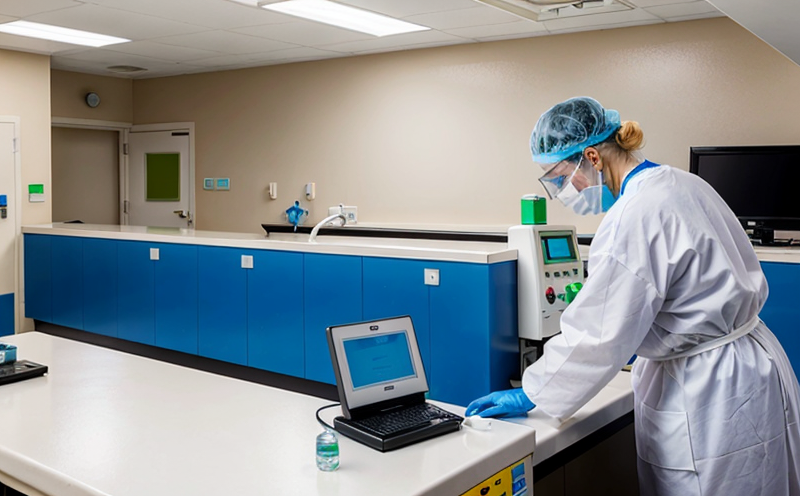Total Bacterial Count Testing in Dialysis Water Systems
In clinical and healthcare settings, particularly within dialysis units, ensuring the safety and quality of water systems is paramount. Total bacterial count (TBC) testing plays a critical role in this regard by providing assurance that water systems are free from harmful microorganisms that could pose risks to patients undergoing dialysis or other medical procedures.
The importance of TBC testing in dialysis water systems cannot be overstated, as even small quantities of bacteria can lead to severe infections and complications. This service ensures compliance with international standards such as ISO 17295:2016 and IEC 62305-4-20 which outline the requirements for the safety of medical electrical equipment in the prevention of infection.
The process involves collecting water samples from various points within the dialysis system, including taps, faucets, and storage tanks. These samples are then transported to our accredited laboratory where they undergo rigorous testing using standardized methods such as the Membrane Filtration Technique (ISO 8692:1995). This technique allows for accurate quantification of viable bacteria present in the water sample.
Once tested, results are reported within a specified timeframe. Compliance with these standards not only helps maintain patient safety but also ensures adherence to regulatory requirements set forth by organizations like the World Health Organization (WHO) and the Centers for Disease Control and Prevention (CDC).
The significance of TBC testing extends beyond mere compliance; it serves as an essential tool in maintaining trust between healthcare providers and their patients. By consistently delivering high-quality results, our laboratory contributes significantly to enhancing public health outcomes.
In summary, total bacterial count testing in dialysis water systems is crucial for safeguarding patient well-being and ensuring regulatory compliance. Our service offers reliable, accurate, and timely analysis that supports the ongoing efforts of healthcare facilities towards providing safe and effective treatments.
Scope and Methodology
Total bacterial count testing encompasses a range of procedures designed to identify and quantify all living bacteria present in water samples taken from dialysis systems. The scope includes the collection, preservation, transportation, and analysis of these samples using internationally recognized standards.
The methodology involves several key steps:
- Sampling: Water samples are collected at multiple points within the system to ensure a comprehensive representation of bacterial presence.
- Preservation: Samples may be preserved with appropriate chemicals if necessary, depending on the nature of the sample and testing requirements.
- Transportation: Samples must be transported under controlled conditions to prevent contamination or degradation before reaching our laboratory for analysis.
- Testing: Upon arrival at our facility, samples undergo rigorous analysis using advanced microbiological techniques including membrane filtration followed by incubation and counting of colonies on agar plates.
- Reporting: Results are compiled into detailed reports that include raw data along with interpretations based on standard reference values provided in relevant international standards like ISO 8692:1995.
This comprehensive approach ensures accurate and reliable results, providing valuable insights into the microbial quality of dialysis water systems.
Why Choose This Test
Total bacterial count testing is essential for maintaining optimal hygiene standards in healthcare facilities, particularly those involved in life-sustaining procedures like dialysis. Here are some compelling reasons why choosing this service is beneficial:
- Compliance with Standards: Ensures adherence to international guidelines such as ISO 17295:2016 and IEC 62305-4-20, reducing the risk of non-compliance penalties.
- Patient Safety: By detecting even trace amounts of bacteria, this test helps prevent the spread of infections which can be particularly dangerous for immunocompromised patients undergoing dialysis.
- Regulatory Requirements: Many regulatory bodies including WHO and CDC recommend regular monitoring of water quality in healthcare settings. This service meets those recommendations ensuring continuous improvement in patient care.
- Quality Assurance: Provides a robust framework for assessing the microbial safety of dialysis water systems, supporting ongoing quality assurance initiatives within healthcare organizations.
- Risk Management: Identifies potential risks early on allowing for proactive measures to be taken before they escalate into serious issues affecting patient health.
- Enhanced Reputation: Demonstrating commitment to excellence in hygiene and sanitation can enhance the reputation of healthcare providers, fostering greater trust among patients and stakeholders.
- Data-Driven Decision Making: Accurate data from this testing allows for informed decision-making regarding necessary improvements or adjustments to existing practices.
- Long-Term Benefits: Regular monitoring helps sustain long-term improvements in water quality, contributing to better health outcomes and reduced operational costs associated with infection-related incidents.
Selecting our total bacterial count testing service ensures you have access to expert knowledge and cutting-edge technology tailored specifically for your unique needs. This commitment translates into peace of mind knowing that every step has been meticulously planned to deliver accurate results and actionable insights.
International Acceptance and Recognition
Total bacterial count testing in dialysis water systems is widely accepted across various countries due to its critical role in ensuring patient safety and regulatory compliance. This service aligns with international standards such as ISO 17295:2016, IEC 62305-4-20, and WHO guidelines which emphasize the importance of maintaining high hygiene standards in healthcare settings.
By adhering to these stringent requirements, our laboratory ensures that all tests conducted meet international benchmarks. This global acceptance underscores the reliability and accuracy of our results, making them valuable not only locally but internationally as well.
The widespread adoption of this testing method highlights its significance in protecting public health worldwide. Healthcare providers who implement rigorous hygiene protocols benefit from enhanced reputation management while also contributing positively to global efforts aimed at reducing healthcare-associated infections (HAIs).
In conclusion, embracing total bacterial count testing demonstrates a proactive approach towards safeguarding patient welfare and upholding the highest standards of care internationally recognized.





